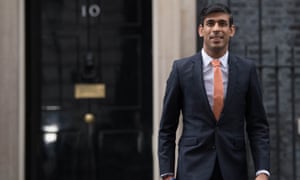Tom Kibasi Thu 13 Feb 2020 15.39 GMT
 |
| ‘The golden boy of the new government.’ The new chancellor, Rishi Sunak, leaving 10 Downing Street, February 2020. Photograph: Stefan Rousseau/PA |
There’s a handy rule of thumb in British politics that applies to almost every premier: “Every prime minister is his own chancellor or foreign secretary.” The departure today of Sajid Javid confirms that No 10 is determined to be in control of economic policy.
Some have praised Javid’s resignation as honourable, but in truth, the former chancellor had no alternative. Had Javid stayed in office, he would have been diminished to chancellor-in-name-only. Boris Johnson’s demand that he replace his own advisers with those handpicked by Dominic Cummings was an offer that the former chancellor could only refuse. It is all the more extraordinary given the brevity of Javid’s tenure (just 204 days), and the timing: a budget is set to be delivered in just 27 days.
Many Westminster watchers will view this through the prism of personality politics; a typical tussle for power in which Cummings, the prime minister’s top adviser, has emerged victorious. But there is more to it than that. Javid was a weak chancellor who lacked either a sense of strategy or vision. He couldn’t decide whether he was continuing austerity or ending it; aligning with the EU or diverging from it; pursuing a more interventionist state or rolling back its frontiers. He deserved to be sacked.
The removal of Javid is the latest illustration of Johnson’s political primacy. As was evident at the time of the Tory leadership contest, nearly four years of Brexit-induced turmoil left him as the last Conservative standing. Those who had their reservations about his character threw their lot in with Johnson because they thought he could win. So it proved, and it leaves the prime minister virtually unassailable.
Javid’s replacement as chancellor, Rishi Sunak, was marked for promotion during the general election, standing in for the prime minister at debates that Johnson shied away from. Just like his predecessor, Sunak is a former City banker. Educated at Winchester and wedded to the daughter of an Indian billionaire, his backstory is far from the son of a bus driver and self-made millionaire Javid.
As the golden boy of the new government – and mindful of the fate of his immediate predecessor – Sunak is unlikely to cause Downing Street much trouble. He owes his ascent in a large part to his loyalty and obedience. But in some respects, Sunak may be in a stronger position than first appears. To lose one chancellor might be considered unfortunate; to lose two would be seen as reckless. But Johnson has repeatedly shown that the old political rules don’t seem to apply to him, so this notion shouldn’t be overstated. Sunak will know that.
Sunak’s main policy contribution has been “free ports”, an idea whose main merit appears to be its evocative name. It is the notion that Britain can establish special economic zones around its ports where taxes and tariffs are nonexistent and the government can merrily provide state aid. This ignores the reality of fixed-capital investments that already exist (manufacturing plants can’t simply be ripped up and relocated) and the requirements of an EU trade deal that won’t allow such a tilted playing field if Britain is to trade freely with its neighbours.
The reality, however, is that Sunak is now merely Cummings’ deputy. With the most powerful economic policymaker now an unelected adviser, this could be the turning point for both economic strategy and for the long-fabled power of the Treasury. Unlike many in the Tory party, Cummings has no fetish for eliminating the deficit. He is not bound by the ideological straitjacket of Treasury thinking. And he cannot be criticised for lacking vision.
The government now talks of nationalisation, significant increases in public investment in research and development and infrastructure, and the introduction of wealth taxes. Margaret Thatcher famously described Tony Blair as her greatest legacy. If this new “national conservative” agenda succeeds, perhaps in time John McDonnell will say the same of Cummings.
https://www.theguardian.com/commentisfree/2020/feb/13/rishi-sunak-treasury-sajid-javid-chancellor-dominic-cummings